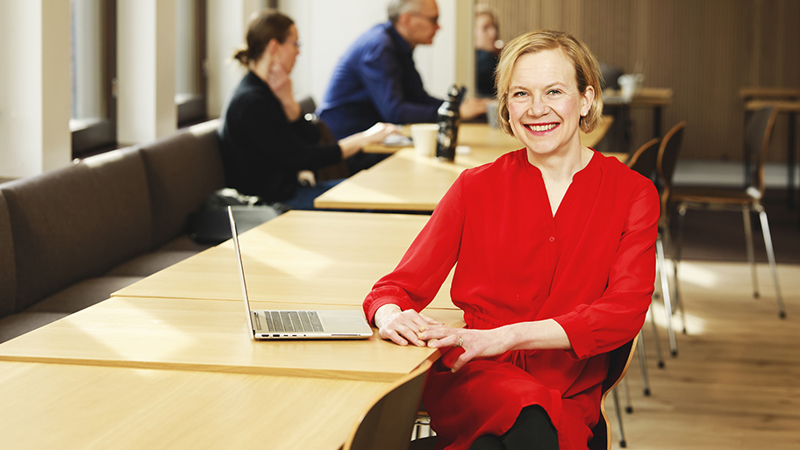A nutritionist urges you to enjoy the Christmas table without a guilty conscience: "The Christmas feast has become too big a troll"
Food is a big part of Christmas. In the opinion of our leading nutrition therapist Mikko Rinta, there is no point in lamenting the Christmas feasts, because in terms of the whole, feasting for a few days is not important.

Every year, many people experience a bad conscience in advance about the fat Christmas treat tables and candy boxes. And when the new year comes, it's time to "bounce back from the relapse" or "get back in shape". At the beginning of January, gyms and weight loss groups are bursting with foodies doing penance exercises.
– Christmas meals also come up at nutritional therapy receptions. Many people wonder how they should approach Christmas feasting. Christmas time often falls on a break of a few weeks from meetings, so it worries many customers from that point of view as well, says Terveystalo's leading nutritionist Mikko Rinta.
Flexible eating is good for both body and mind
According to Mikko Rinta, at Christmas you can give yourself permission to eat a little more freely.
– Varied and flexible eating is good for both body and mind. If Christmas food already causes stress in advance, it is good in relation to weight control to decide in advance that Christmas week is a holiday and there is no need to count the bites. There is also no need to ban or classify any foods as prohibited. A more permissive attitude and a more relaxed approach are better for Christmas, says Rinta.
The basics of healthy eating always support well-being
However, it is good to stick to the basics of healthy eating both on weekdays and on holidays. So you can aim to eat regularly around 4–6 times a day even at Christmas. This way the body gets the energy and nutrients it needs.
– When eating in everyday life is sufficient, regular and flexible, there is no need to be afraid of eating "getting out of hand" during the holidays. The Christmas feast has been made into a far too big troll – eating rarely gets out of hand and absolute prohibitions only add to the problems. So you can enjoy the flavors and eat according to your body sensations. The body also takes care of balancing the variation in food quantities and weight regulation in the long term and thus smooths out the variation between everyday life and festive moments, Mikko Rinta concludes.
Consider these at Christmas:
- Decide in advance how you feel about Christmas treats. If you give yourself permission to indulge, act accordingly and don't feel guilty about every bite.
- Christmas feasting does not cause permanent changes in health if you eventually return from festive eating to moderate everyday eating. Guilt does not benefit anyone - the most important things in terms of health are done in everyday life.
- When feasting, you should remember to take care of your fluid balance: during the holiday of salty Christmas food, mulled wine and wine, drinking water is easily forgotten. Drinking too little makes you feel congested, so remember to drink water during Christmas as well.
Latest articles

A mind-friendly and brain-healthy holiday - how to recover and recharge your batteries?
Many people start their summer holidays after Midsummer. For a holiday to soothe your mind, take a look at Terveystalo's occupational health psychologist Tiina Tuominen's tips for a restorative holiday.

What future leadership looks like?
According to Hertta Vuorenmaa, an expert on the future of work and management, work is a huge social institution, and changing it is always difficult because we have established ideas about how to do work. Understanding historical turning points can help in managing current changes, as changes in working life are not only technology-driven, but require holistic thinking and managing people's emotions.

The approaching holiday feels stressful – What can help?
The holiday is approaching, but work issues are piling up and there’s conflict in the family about how to spend the time off. Excessive expectations and the pressure to “make the most of it” can cause unnecessary anxiety.

"Let life show at work"
Humanity in the workplace feeds well-being and productivity. Workplaces need a new culture that genuinely values diversity and takes into account different life situations," says Eveliina Holmgren, an organisational psychologist at Terveystalo.

Tips from an organisational psychologist: how to create psychological safety in the workplace
Eveliina Holmgren, an organisational psychologist at Terveystalo, explains how to get started in strengthening psychological safety in the workplace.

Get rid of type 2 diabetes with lifestyle changes
When Timo Partanen found out at his health check that he had type 2 diabetes, he realised that he would end up taking medication for the rest of his life if things continued as they were. The diagnosis made him think about his future and motivated him to make a permanent change.